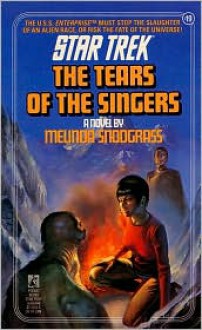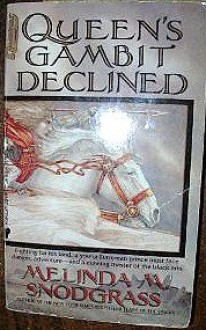


 3.75 stars
3.75 stars
When a star ship disappears in the Taygeta V system, Captain Kirk enlists the help of a prominent, but tempermental musician and two Klingon warship to help him investigate the phenomenon. The anomaly may be linked to the semi aquatic creatures who live on Taygetian. But with the restless Klingons on one hand, human hunters decimating the Teygetians on the other, and an expert who may succumb to illness at any moment, Kirk might just run out of time...
This isn't the best in the Star Trek series, although the author has a good sense of the characters, and their speech patterns are pretty spot one (see below for individual analysis). A bonus is that Uhura gets more screen time than usual: unfortunately, most it is spent mooning over the expert, a new character who is more irritating than fascinating.
Summary: Tears of the Singers is quick, fun, with a good pace, but rather silly with a heavy-handed moral about animal rights. Good when you need a book to fill an hour or so.
Character portrayals (author understood character, good voice, etc)
Kirk: B
Spock: A
McCoy: B (Voice - B-)
Scott: B
Uhura: A-
(Sulu and Checkov were not in this enough for analysis)

I just pre-ordered this one due out Dec. 3.
Checkout who contributed works:
The Dangerous Women anthology contains following stories:
- Introduction by Gardner Dozois
- “Some Desperado” by Joe Abercrombie - A Red Country story
- “My Heart is Either Broken” by Megan Abbott
- “Nora’s Song” by Cecelia Holland
- “The Hands That Are Not There” by Melinda Snodgrass
- “Bombshells” by Jim Butcher - A Harry Dresden story
- “Raisa Stepanova” by Carrie Vaughn
- “Wrestling Jesus” by Joe R. Lansdale
- “Neighbors” by Megan Lindholm
- “I Know How to Pick ’Em” by Lawrence Block
- “Shadows For Silence in the Forests of Hell” by Brandon Sanderson
- “A Queen in Exile” by Sharon Kay Penman
- “The Girl in the Mirror” by Lev Grossman - A Magicians story
- “Second Arabesque, Very Slowly” by Nancy Kress
- “City Lazarus” by Diana Rowland
- “Virgins” by Diana Gabaldon - An Outlander story
- “Hell Hath No Fury” by Sherilynn Kenyon
- “Pronouncing Doom” by S.M. Stirling - An Emberverse story
- “Name the Beast” by Sam Sykes
- “Caretakers” by Pat Cadigan
- “Lies My Mother Told Me” by Caroline Spector - A Wild Cards story
- “The Princess and the Queen” by George R.R. Martin - A Song of Ice and Fire story
 The style isn't what I'd call strong, and frankly there were a couple of times I considered abandoning reading this--because they style isn't strong and it seemed to be running along predicable lines. It may also have been the fault of a nasty cold that's shot my ability to really concentrate to hell that made it hard to initially connect with the book. Ultimately the book wasn't so predictable though, and in a way that's hinted at before you ever read the first line of the prologue, hinted at in the dedication where Snodgrass calls this an "anti-fantasy" and at the very title.
This is both alternate fantasy and historical fantasy, with a mix of historical figures and fictional characters. The central character is William of Orange, the man who later in life would become half of William and Mary after marrying the future Queen of England. At the start of the book he's days away from his 18th birthday, studying at the feet of the great philosopher Baruch Spinoza and dark forces are gathering that threaten his land, Holland. Magical forces at that, and this is where the book first seems to tread very familiar formulaic territory as William gains companions on a quest to gather magical talismans. And where things begin to veer off the line of history. Ultimately though, I did very much like where Snodgrass went with all this, how she fit all the pieces, and her Prince William is certainly an appealing hero. And after all, this book does what good historical fiction is supposed to do. It makes me want to learn more about the real William of Orange--and the real Baruch Spinoza. (And the glimpses with get of Merry Charles II of England and Louis XIV the "Sun King" of France are intriguing too.)
The style isn't what I'd call strong, and frankly there were a couple of times I considered abandoning reading this--because they style isn't strong and it seemed to be running along predicable lines. It may also have been the fault of a nasty cold that's shot my ability to really concentrate to hell that made it hard to initially connect with the book. Ultimately the book wasn't so predictable though, and in a way that's hinted at before you ever read the first line of the prologue, hinted at in the dedication where Snodgrass calls this an "anti-fantasy" and at the very title.
This is both alternate fantasy and historical fantasy, with a mix of historical figures and fictional characters. The central character is William of Orange, the man who later in life would become half of William and Mary after marrying the future Queen of England. At the start of the book he's days away from his 18th birthday, studying at the feet of the great philosopher Baruch Spinoza and dark forces are gathering that threaten his land, Holland. Magical forces at that, and this is where the book first seems to tread very familiar formulaic territory as William gains companions on a quest to gather magical talismans. And where things begin to veer off the line of history. Ultimately though, I did very much like where Snodgrass went with all this, how she fit all the pieces, and her Prince William is certainly an appealing hero. And after all, this book does what good historical fiction is supposed to do. It makes me want to learn more about the real William of Orange--and the real Baruch Spinoza. (And the glimpses with get of Merry Charles II of England and Louis XIV the "Sun King" of France are intriguing too.)